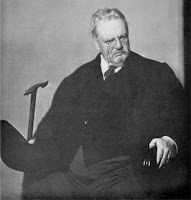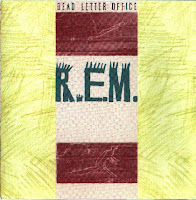 Album
Album: R.E.M.,
Murmur, 1983 (dub)
Best Track: "
Catapult"
Lasting Memory: Arranged chronologically from 1981 through 1985, the record of my album acquisitions would start strongly with the Who's
The Kids Are Alright and quickly reach the nadir of Twisted Sister's
Stay Hungry. Taping R.E.M.'s
Murmur off a friend's dubbed copy of
Murmur during the fall of my freshman year of high school righted my musical ship.
In fact, listening to
Murmur was a downright conversion experience. I taped the R.E.M. album over my up-to-then revered copy of J. Giels Band's
Showtime. Also, as near as I can figure, the only cheesy heavy metal album I bought for the first time after 1984 was Triumph's
greatest hits compilation
Classics. Still can't get enough "
Fight the Good Fight," even to this day. But that's a post for another day.
What is most cromulent now is that there was something about the
sound of R.E.M.'s music that grabbed me pretty much instantly and never let go. That reads stupid, I know. All music sounds, but what I'm trying to convey is that the strained-almost-to-breaking jangle and nearly indecipherable not-quite-high-lonesome vocals appealed to me in a way that no other music ever really had.
R.E.M. was my gateway to the contemporary urban folk of artists like Billy Bragg, the traditional country of titans like George Jones, and yet-to-be
fusioned alt country of bands like Uncle
Tupelo. And R.E.M. was so much unlike any other band being played on the radio in the early 1980s that the music it made, for all any high
schoolers knew in those
pre-Internet days, constituted a genre unto itself.
Of course, it bears mentioning, as someone who I can no longer identify accurately did decades ago, that no album has ever been more accurately titled than
Murmur. Without looking them up, just try to figure out all the lyrics to "
Radio Free Europe" or "
Shaking Through."
But don't they sound great?
Even greater sounding, to me anyway, are "
Perfect Circle" and "
Catapult," in which the pretty nonsensical lyrics are reasonably audible. Maybe the inverse property applies, meaning R.E.M.'s lyrics make more sense the harder they are to understand. I'll never know because I truly enjoy the
murmuring. It's very comforting, especially when heard coming off my 27-year-old third-generation dubbed cassette and through the impossibly cheap speakers of my 19-year-old mini boom box.
Two other standout tracks off the truly seminal debut full-length album that is
Murmur are "
Laughing" and "
West of These Fields." I've no further insights on the songs, but in chasing down the video links, I found myself marvelling at what advanced sound board recording and stage videotaping setups R.E.M. had when they were first starting out. The boys from Athens, Ga., must have know from the beginning that they would be one of the biggest bands in the world.
Time and events proved them were correct, but the presumption seems a little, well,
presumptuous.
Up Next: R.E.M.
Fables of the Reconstruction, 1985













